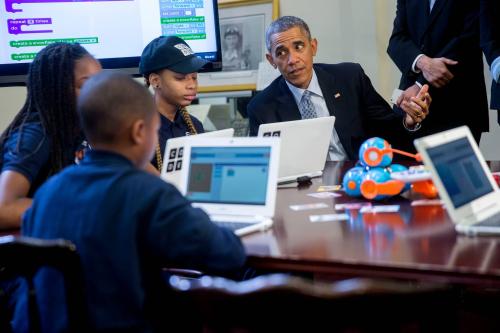By Stuart M. Butler
Last week the online education firm Coursera announced a new arrangement with Google, Instagram and other tech firms to launch what some are calling “microdegrees” – a set of online courses plus a hands-on capstone project designed in conjunction with top universities and leading high-tech firms. Together with other developments, such as rival MOOC developer Udacity’s “nanodegree” program, the Coursera announcement could be an important step in a radical shakeup of higher education.
10 new innovations that could change the world
By Joshua Bleiberg and Hillary Schaub
Since 2001, the MIT Technology Review has released their list of the 10 most important technological innovations that emerged each year. The editors selected each item based on its potential to change the world. Previous years lists included agricultural drones, ultra-private smartphones, brain mapping, neuromorphic chips, genome editing, mobile collaboration, and micro 3-D printing. The 2015 list is just as exciting.
Advancing financial inclusion in Southeast Asia, Central Asia, and the Middle East
By Robin Lewis, John Villasenor, and Darrell West
This blog post will dive into a few of the obstacles and opportunities facing FDIP countries in central Asia, the Middle East, and southeast Asia as they move toward greater access to and usage of financial services among previously marginalized groups.
By Joshua Bleiberg and Darrell West
The button started as a simple April Fools’ Day prank on Reddit, the Internet super-forum. As of the publication of this post over 800,000 people have pressed the button and in a little under a month the clock has never reach zero. The wild success of the button holds interesting lessons for how to develop public policies in the Internet age.
New Arizona State-edX MOOC: Another blow to traditional college
By Stuart M. Butler
In late April Arizona State University (ASU), in partnership with edX announced it will offer MOOCs for credit this Fall. The cost for each course will be no more than $200 per credit hour or less than half the amount ASU charges for its regular online or in-person courses. If a student is not concerned about getting credit, the courses, like most MOOCs, will be free.
The Blockchain: What It Is and Why It Matters
By Mohit Kaushal and Sheel Tyle
Chances are that you’ve heard of bitcoin, the digital currency that many predict will revolutionize payments – or prove to be a massive fraud – depending on what you read. Bitcoin is an application that runs on the Blockchain, which is ultimately a more interesting and profound innovation.
Five emerging battery technologies for electric vehicles
By Jack Karsten and Darrell West
Much research and development is being done on battery technology to improve performance while still being lightweight, compact, and affordable. Despite the current shortcomings of batteries, even moderate improvements can have a large global impact.
How robots, artificial intelligence, and machine learning will affect employment and public policy
By Jack Karsten and Darrell West
Emerging technologies like industrial robots, artificial intelligence, and machine learning are advancing at a rapid pace, but there has been little attention to their impact on employment and public policy. Darrell West addresses this topic in a new paper.
How the 2016 presidential candidates prioritize space exploration
By Nick McClellan and Darrell West
The next presidential administration has the potential to impact the way we make use of data collected by projects like New Horizons and how we provide material support for future extra-terrestrial exploration.
New jet engine designs cut U.S. military fuel costs
By Jack Karsten and Darrell West
While current jet engine designs optimize either speed or fuel efficiency, new adaptive engine designs promise better performance and a 25 percent reduction in fuel consumption.



Commentary
Year in review: the top TechTank posts of 2015
December 14, 2015